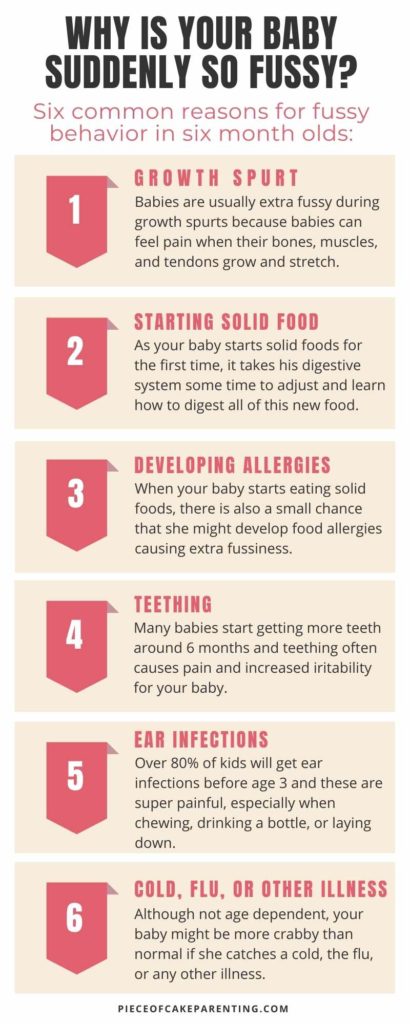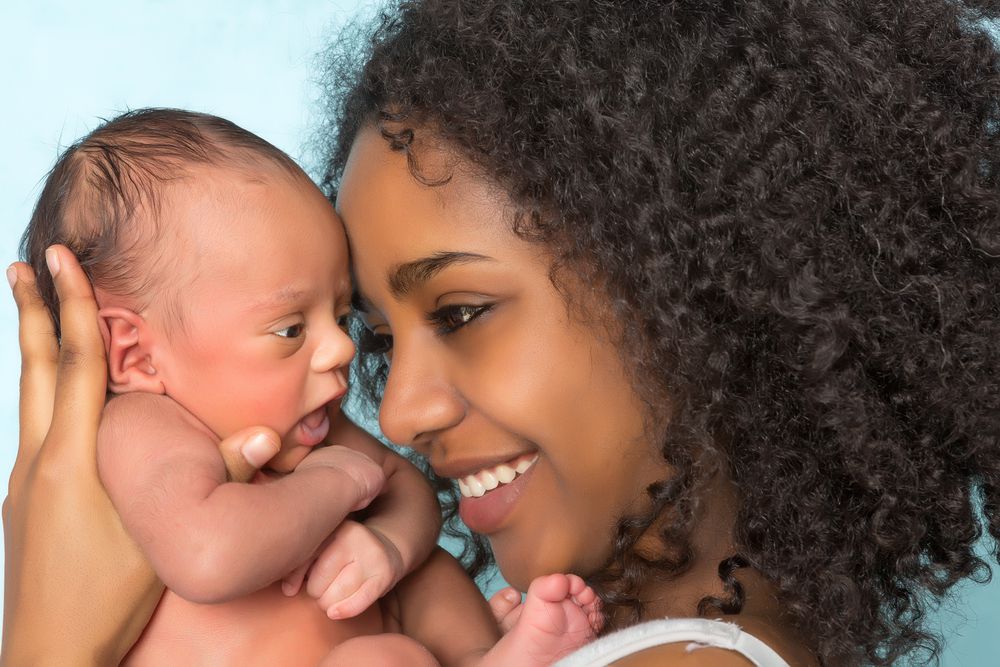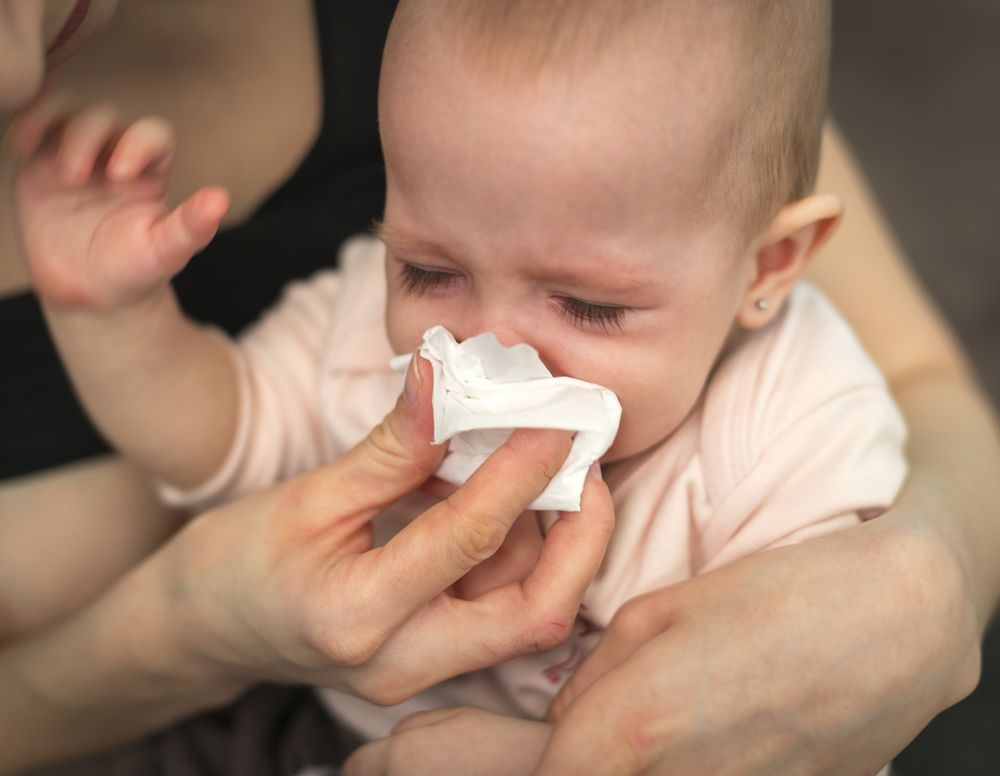As a new parent, there comes a point where you finally feel like you’ve figured things out and have found your groove.
After all of the challenges of the fourth trimester, your baby is finally sleeping better and you relax and really start to enjoy your new role as a parent.
But then out of nowhere, BAM! Your baby turns six months old (give or take) and it seems like overnight you take ten steps backward!
If you’re like me, you scratch your head and wonder:
“What is causing this sudden fussy behavior in my 6 month old baby???"
It’s common for your baby to go through a period of extra fussiness around the six month mark. This is because they’re going through so many transitions and developmental milestones at this age. Understanding the causes of fussiness in your six month old baby helps you to be more empathetic and better support your baby through these challenges.
(Remember, every baby is different and these milestones all occur at slightly different times. Your baby might be facing these challenges a little before or a little after she turns 6 months old.)
*Updated 5/11/21
Jump To:
🤷♀️ Why is it helpful to understand why your baby is extra fussy? 🤔 What are some of the most common reasons why your 6 month old baby is so fussy all of the sudden? 📏 Six Month Growth Spurt 🍽️ Starting Solid Food 🤧 Developing Allergies 😬 Teething 👂 Ear Infections 🤒 Baby Cold, Flu, or Other Illnesses 💭 Final Thoughts
DISCLOSURE: Piece of Cake Parenting is a participant in the Amazon Services LLC Associates Program, an affiliate advertising program. As an Amazon Associate, I earn from qualifying purchases. Read more about these links in my disclaimer policy.
Why is it helpful to understand why your baby is extra fussy?
We’re only human, and it’s easy to get frustrated with our babies when they are constantly fussy.
Especially when things finally seemed like they were getting easier after surviving the fourth trimester.

After all, caring for a fussy baby is incredibly exhausting for mom and dad. And it’s hard not to feel frustrated if you don’t get enough sleep or alone-time or if you feel like you can’t deal with the crying anymore.
Fortunately, I strongly believe that once you understand all of the things your baby is going through and why these fussy periods are happening, it is so much easier to feel more patient, empathetic, and supportive and make it through these tricky phases.

What are some of the most common reasons why your 6 month old baby is so fussy all of the sudden?
If you take a step back and think about it, your baby goes through A LOT in the first few years.
Your baby’s brain is growing rapidly every day. They’re learning new skills, developing their sense of self, and discovering the world around them – all while their little body is changing and growing dramatically.

Plus, you have to factor in teething, illnesses, and other challenges which all account for certain fussy periods with your baby.
⭐ Reminder: Before reading my list of reasons why your baby might suddenly be more fussy than normal, just a quick remember that every baby is different and you should absolutely listen to your gut and consult with your doctor if you think something is wrong.
1. 6 Month Growth Spurt
Many babies also have a 6 month growth spurt, and babies are usually extra fussy when going through any growth spurt.
As their bodies grow, babies can feel pain when their bones, muscles, and tendons grow and stretch.
They’re also extra hungry as they pack on the calories to get through the growth spurt. AND it often messes with their sleep.
Pretty fun combination, right? 🤪

There’s a particularly challenging sleep regression at six months which causes both you and your baby to be crabbier throughout the day because of lack of sleep.
This can be really hard for parents to be patient with because it’s hard to see a growth spurt.
However, it’s important for you to know that at six months your baby is going through so many physical and cognitive changes.
And unfortunately when babies go through these big developmental changes and milestones, they’re usually extra fussy as they process all of this.
Be patient with your baby and give lots of extra cuddles.
Make sure that you’re consistent with your schedule and remember that things will get better. Before you know it, your baby will be sleeping even better than before!
2. Starting to Eat Solid Food
Starting solid food is a very common reason that your baby might suddenly be much more fussy than normal as she starts eating more and more foods.
Our baby loved trying new flavors and textures, but his poor little belly did not love digesting all of these new foods. And we definitely noticed that our six month old was much more irritable as he learned how to digest these new foods.
Your baby’s new solid food diet can cause constipation, rashes, stomach aches, and more. No wonder you’re seeing an increase in fussiness!

As you introduce more foods and textures, it becomes even more likely that your baby will experience stomach aches or constipation as their digestive system learns how to digest everything.
And, you guessed it. This often causes increased fussy behavior around 6 to 7 months old.
It is hard for your baby’s stomach to make this switch and totally normal for your baby to cry more for a few weeks while their digestive system gets used to this change.
Pro-Tip: Some foods are more likely to cause constipation (examples: bananas, rice cereals, cheese, pasta, potatoes) and others are more likely to alleviate constipation (examples: prunes, pears, plums, and beans). Try to have a mix of these foods and offer a few additional ounces of water to help avoid constipation.
3. Developing Allergies
As your baby starts eating more and more solid foods, there is also a small chance that they might develop food allergies. This can certainly cause your baby to be extra fussy if he is having an allergic reaction to any of his foods.

As you introduce new foods, follow your doctor or dietitian’s recommendations regarding new foods, especially those that are highly allergenic.
We worked with My Little Eater and introduced one highly allergenic food at a time starting at 6 months old.
If your baby is more fussy than normal, and you’re not sure if it’s related to an allergy, pay special attention to any signs and symptoms after meal times.
⭐ Pro-Tip: If your baby suddenly has a shrill or hoarse sounding cry, especially any persistent or excessive crying after eating a specific food, he might have a food allergy.
You might also notice diarrhea, vomiting, runny nose, congestion, hives, or difficulty breathing (which you should call your doctor about ASAP). If you notice any of these symptoms and suspect a food allergy, make sure to talk to your doctor right away.
If you think you’re baby might suddenly be extra fussy because of food allergies, work with your doctor to identify any allergens and decrease any extra fussiness that is caused by these symptoms.
4. Teething
Any parent that has been through teething knows how horrible it is. It’s awful watching your baby cry in pain as he works on cutting his new teeth.
Although many babies start teething around 6 months, it can be super variable when this starts for your baby. Mine got his first two teeth at 4 months. Then he got a little break and cut 3 teeth in 4 days once he turned six months old!
As soon as these popped through, we knew exactly why he was so crabby.
When babies are teething, they are usually extra fussy. And I don’t blame them. I remember when my wisdom teeth came in. It hurt!
Again, try to be patient and help your baby feel some relief while she’s teething.
A few signs of teething include a swollen spot on the gum, lots of drooling, and chewing on everything.
⭐ Pro-Tip: Help your baby to feel better by rubbing your finger on his gums, letting him chew on something hard (wooden teething toys are awesome!), or sucking on milksickles!
5. Ear Infections
Although teething is bad, I’m starting to think that ear infections are even worse. Almost any time our baby is suddenly extremely fussy, especially all night long, this is usually the culprit.

Although this common cause of a super grumpy baby isn’t age-related, ear infections are very common in kids. In fact, over 80% of kids will have an ear infection before age 3 (and many will have multiple!).
⭐ Pro-Tip: An ear infection is inflammation in the middle ear and it causes bacteria to build up behind the eardrum. This swelling along with any additional fluid can be incredibly painful and cause your baby to suddenly be more cranky all the time.
Pain from ear infections is often worse when chewing, sucking a bottle, or laying down because this is when the pressure is the highest. This is why your baby might suddenly be super fussy at night and cry way more often than normal.
A few signs of ear infections include excessive fussiness and crying, pulling at the ear or trying to put a finger or other object in the ear, trouble sleeping, fever, fluid draining from the ear, balance problems, or trouble hearing.
If you think your baby is struggling with an ear infection, you can offer an over-the-counter pain medication based on your doctor’s recommendations and visit your doctor to determine if additional medications are needed to clear up the infection.
6. Baby Cold, Flu, or Other Illnesses
One more reason why your baby might be more crabby than normal that isn’t age dependent but super common is coming down with a cold, flu, or any other illness.
My baby happened to get his first cold at six months while he was dealing with all of the rest of these challenges and milestones and this definitely made him extra crabby.
Your baby is exposed to tons of different bacteria and viruses and it’s only a matter of time until they come down with some type of illness.
Unfortunately, when this happens, your baby will feel uncomfortable and worn down, which is often accompanied by a very fussy baby.

This one was the hardest on the list for me because it was obvious how much my baby struggled and I just felt so bad for him.
He had a fever and a super runny nose, he was so congested he hardly slept, and he just kept looking at me with his big brown eyes like he was begging me to make everything better.
Although I couldn’t instantly make him feel much better, we did lots of steam baths, squeezed in tons of extra comfort nursing sessions, and really put our Nose Frida to use.
Final Thoughts:
I know it’s hard, but when your baby is crabby and fussy, try to be patient and understanding.
We got hit hard when my baby turned 6 months and dealt with five out of six of these challenges.
Trust me when I say that I understand that listening to the constant crying or dealing with the never-ending nursing sessions can be really frustrating.
But once I thought about all that my 6 month old was dealing with and put myself in his shoes, I became so much more empathetic.
If your baby is suddenly way more crabby than normal, try to figure out what is going on.
Are they extra crabby at certain times of the day or only at night? Showing any signs of an illness? Are there things you do that seem to help?
Once you figure out a little more about what is going on and what helps your baby to feel better, try to be as patient as possible, and know that the good news is that all of these things are short-lived.
Cuddle and show your baby lots of extra love until they make it through these challenges.
By this time next week, they’ll be feeling much better. And who knows, maybe you’ll be like us and also be surprised at how much your baby learns and grows during this rough week!
💬 Do you notice any other things that are causing extra fussiness in your baby? What tips help you and your baby on these fussy days?
*Piece of Cake Parenting is a participant in the Amazon Services LLC Associates Program. As an Amazon Associate, I earn from qualifying purchases. Please visit Piece of Cake Parenting’s Terms of Service, Disclaimer, and Privacy Policy for more information.
